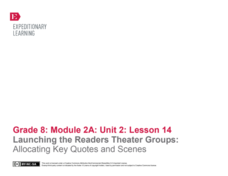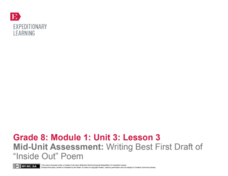University of Oklahoma
Understanding My Rights and Responsibilities
Three scripted lessons comprise a unit designed to inform special needs students about their rights and responsibilities in high school. In the first lesson class members examine the Individuals with Disabilities Act (IDEA), Child Find,...
University of Oklahoma
Understanding My Individualized Education Program
The final unit the series helps learners become familiar with the major components and vocabulary in their IEPs. Using a KWL chart, class members record information about their IEPs and set goals for themselves.
EngageNY
End of Unit Assessment: Making Connections between Song Lyrics and Texts
For the end-of-unit assessment, scholars engage in small group Socratic seminars to connect the lyrics of two songs to texts they read and studied. They discuss how the songs "Ain't Gonna Let Nobody Turn Me Around" and "Lift Every Voice...
EngageNY
Preparation for End of Unit Assessment: Making Connections between Song Lyrics and Texts, Part 2
Five hundred schoolchildren first performed the song "Lift Every Voice and Sing" in 1900 to celebrate President Lincoln's birthday. Scholars listen to the historic song and discuss the lyrics with partners. They continue preparing notes...
EngageNY
Preparation for End of Unit Assessment: Making Connections between Song Lyrics and Texts, Part 1
Song lyrics can help people better understand literary texts. Scholars continue listening to "Ain't Gonna Let Nobody Turn Me Around" and discuss the connections between the song's lyrics and Carlotta Walls LaNier's memoir, A Mighty Long...
EngageNY
World Cafe: Analyzing the Jim Crow Laws
The Plessy v. Ferguson Supreme Court case connected to the Jim Crow laws. Scholars explore the topic using the World Café protocol to analyze specific Jim Crow laws. They discuss how the laws relate to Plessy v. Ferguson and their...
EngageNY
Studying Conflicting Information: Varying Perspectives on the Pearl Harbor Attack, Part 2
Scholars take another look at Japan's Fourteen-Part Message. They then take turns adding ideas to sentence starters to create ideas about the different perspectives of government. To finish, groups mix and mingle to share their sentences...
EngageNY
Launching the Performance Task: Prompt, Characters, Groups
Scholars unpack the word confession as they prepare to write confessionals based on characters from Shakespeare's A Midsummer Night's Dream. Next, they read their narratives to a small group of peers as part of a final performance task.
EngageNY
End of Unit 1 Assessment: Fishbowl Discussion, Part 2: Comparing Conflicting Accounts of the Pearl Harbor Attack
Partner up! Scholars continue their fishbowl activity with one partner sitting inside the circle and one sitting outside the circle. Participants add to sentence starters to analyze the perspective of the Pearl Harbor Attack seen in the...
EngageNY
End of Unit Assessment: Fishbowl Discussion, Part 1: Comparing Conflicting Accounts of the Pearl Harbor Attack
Scholars continue discussing Unbroken by using a fishbowl activity. Some readers share thoughts about the Day of Infamy, while others sit and observe the conversation. After the activity, pupils share what they learned.
EngageNY
Examining How Word Choice Contributes to Tone and Meaning: Close Reading of “Wet and Crying”
Scholars participate in a Write-Pair-Share activity while answering questions about the meaning of words in "Wet and Crying." They use their Write-Pair-Share note-catchers to guide their thoughts and then share with the class. After...
EngageNY
Close Reading: Fishbowl Comparing Atticus and Mr. Gilmer (Chapters 17-19)
Class members participate in two circle group discussions to compare Atticus and Mr. Gilmer in chapters 17-19 of To Kill a Mockingbird. They use a note-catcher to guide their thinking. For homework, readers begin looking at chapters 20-21.
EngageNY
Peer Critique of “Inside Out” and “Back Again” Poems
Class members closely examine the use of words in the poems "Inside Out" and "Back Again" to determine if different words would create more powerful poetry. They then conduct peer reviews of the poems they created and offer suggestions...
EngageNY
Analyzing Poems from Inside Out and Back Again to Develop Criteria for an Effective Poem
Scholars analyze a model poem to help guide their poetry writing. They use Think-Pair-Share to discuss word choice and meaning in "Papaya Tree" and "Wet and Crying." To finish, they use their discussions to collect evidence on what makes...
EngageNY
Launching the Readers Theater Groups: Allocating Key Quotes and Scenes
There's no I in collaboration! Scholars work in small groups to write a Readers Theater script for a scene from Harper Lee's To Kill a Mockingbird. Next, within their small groups, pupils discuss how their scenes communicate the main...
EngageNY
End of Unit Assessment: Writing Best First Draft of “Back Again” Poem
Team up! Scholars begin working with their research teams to review the components of an effective poem. They then move on to independent work by beginning the end-of-unit assessment. Writers complete the draft of their "Back Again"...
EngageNY
Mid-Unit Assessment: Writing Best First Draft of “Inside Out” Poem
As part of a mid-unit assessment, scholars draft their inside-out poems and then work on their "Back Again" poems. Learners use a rubric and graphic organizers to guide their writing.
EngageNY
Finishing Who? Where? and Why? Research
Who? Where? Why? Scholars answer these questions to help identify the gist of Inside Out & Back Again. First, they add text evidence to their research folders. They then begin looking at a performance task in which they write their...
EngageNY
Comparing Meaning and Tone: The Fall of Saigon in Fiction and Informational Text
Who's that talking to? Readers listen to a reading of the "Forgotten Ship" transcript and answer questions focusing on word meaning and choice. They complete a chart to track the multiple narrators in the script. For homework, readers...
EngageNY
Analyzing Character: Understanding Atticus (Chapter 1, cont.)
Scholars use a Note-catcher to gather text evidence to reveal the character of Atticus Finch in To Kill a Mockingbird. After collecting evidence, they work with a partner to make an inference about the character and then share their...
EngageNY
Building Background Knowledge: Vietnam as a “Battleground in a Larger Struggle”
Read. Stop. Think. Scholars use a reading strategy to process the challenging text, "The Vietnam Wars." They read a paragraph and then stop to think about the text and its meaning. Readers then go on to work with partners and make notes...
EngageNY
Mid-Unit Assessment: Getting to Know a Character: What Details in the Text Help Us Understand Ha?
Take a walk with me. Scholars participate in a gallery walk of the anchor charts their groups created about Inside Out & Back Again in the previous lesson plan. Pupils take notes about Ha's character on sticky notes as they take the...
EngageNY
Inferring about Character: Close Reading of the Poem “Inside Out” and Introducing QuickWrites
Grab a partner! Scholars partner up to take a second look at the verse novel Inside Out & Back Again. They discuss questions about and connections to the novel and then learn how to complete a Quick Write task properly. To finish,...
EngageNY
Launching the Novel: Character Analysis of Ha
Scholars receive numbers as they work in groups to read Inside Out & Back Again. The instructor calls out specific numbers for readers to share the group's thoughts. Then, they use a model passage to demonstrate the effective actions...

























